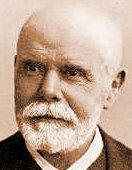
O Estado deve assegurar a justiça na distribuição da riqueza, melhorar as condições de vida da classe operária e criar instituições de interesse público
![]()


The Great Society, even if it should deprive men of some of the romance and intimacy of life, must, they thought, at least give them such an increase of security as would be far more than an equal return. Famine would be impossible when any labourer could buy flour and bacon from the world-market in his village shop. Wars would be few and short if they meant dis- aster to an international system of credit.
![]()

The mark of the modern world is the imagination of its profiteers and the counter-assertiveness of the oppressed. Exploitation and the refusal to accept exploitation as either inevitable or just constitute the continuing antinomy of the modern era, joined together in a dialectic which has far from reached its climax in the twentieth century
![]()

Walras, Léon
O equilíbrio geral consegue-se através de uma concorrência sem restrições, conseguindo-se uma espécie de regresso à ordem imutável
![]()

Complex equality requires a diversity of distributive criteria that mirrors the diversity of social goods. Each social good or set of social goods - such as security and welfare, money and commodities, social office, free time, education, and political power - constitutes a sphere of justice and each sphere is governed by criteria derived from the social meaning of its good or set of goods. There are many spheres of justice, and principles of justice are internal to each distributive sphere
![]()

If anarchy is identified with chaos, destruction and death, then the distinction between anarchy and government does not tell us much
![]()

O Estado é a estrutura social integrante de forças antagonistas num conjunto ordenado
![]()

The inevitability of gradualness...
![]()

A ciência diz o que nós queremos e o que nós podemos, nunca o que nós devemos
![]()

A repressão reforça a coesão do reprimido; o perigo presente faz surgir hipóteses de vitória futura; a minoria, convencida que não tem nada a perder a não ser as suas cadeias, arrisca tudo porque pensa que já não tem nada a arriscar
![]()

Acreditar naquilo que não podemos apreender é mais real que aquilo que nós podemos apreender
![]()


A cibernética é a ciência da comunicação e o controlo nos animais e nas máquinas, salientando que o ser vivo é uma máquina entre cujas funções, uma é a de montar a própria máquina. E isto porque os organismos só actuam graças à aquisição, ao uso, à conservação e à transmissão da informação
![]()
It is a liberation of the spirit to acquire perspective, to recognise that every generation is confronted by problems of the utmost subjective urgency, and that an objective grading is probably impossible; to learn that the same moral predicaments and the same ideas have been explored before
![]()
Willoughby, W. W.

Liberty has never come from Government. Liberty has always come from the subjects of it. The history of liberty is a history of limitations of governmental power, not the increase of it.
![]()

Compreender Kant tem de ser ir além de Kant
![]()

From water does all life begin
![]()

Sobre aquilo que não se pode falar é melhor calarmo-nos
![]()

Esta sociedade estabelecida entre todas os Estados, tendo em vista a salvação comum das mesmas, toma o nome de civitas maxima, cujos membros, ou por assim dizer, os cidadãos, são os Estados
![]()
![]()
Wollstonecraft, Mary
Let not men then in the pride of power, use the same arguments that tyrannic kings and venal ministers have used, and fallaciously assert that women ought to be subjected because she has always been so

![]()

























